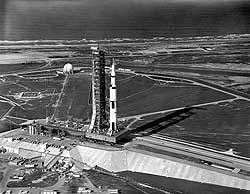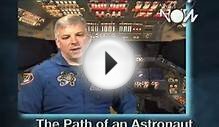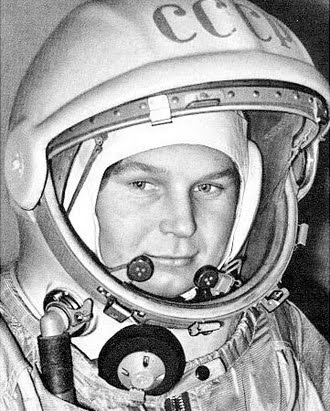
 Now we know it was about protecting civilization.
Now we know it was about protecting civilization.
But to be able to look upon the moon on July 8, 1969, knowing no man had ever set foot upon (and the wonderment of what would come after they did) is a thought I'd trade anything for at this point.
For we live in a world where we now know what came next.
The abandonment of space exploration for the ceaseless, never-ending promotion of blacks (and now all racial minorities and aggrieved special interests groups).
And in the 45 years since we first went to the moon, the trillions of dollars (and untold hundreds of trillions of opportunity costs lost) spent on this 24/7/365 campaign to dismantle our civilization to the benefit of blacks has - if you open your eyes up for only a moment - produced example after example after example our ancestors knew far more than we did about race.
Though will never know what truly went through his mind, Deke Slayton was perhaps the most important man behind the success of NASA from 1962 to 1972 (the era before diversity became the primary goal of the space agency instead of, you know, space exploration). Slayton was the voice of the Mercury astronauts, the man who selected the crews who flew the Gemini, Apollo, and Skylab missions.
Deke! U.S. Manned Space: From Mercury to the Shuttle is the story of Donald K. "Deke" Slayton, an autobiography of man whose greatness is an embarrassment to our generation.
In his book, Deke explains how the astronaut candidates was selected in an era before black women (with a huge racial chip on their shoulder) like Ruth Bates Harris came to lord over NASA and derail our space efforts - momentarily - for the promotion of the same people who would inherit Detroit via white flight and turn it into... Detroit.
This is how Deke describes how astronauts were selected, and how even in 1962 the Federal Government was working to promote blacks as the primary goal of every mission:
All the while the astronaut selection process continued. We had known going into the 1962 selection that we would need more astronauts at some point in the future, so as the nine new guys completed their initial training, we decided to pick up some more. Gemini was always intended to consist of ten or eleven manned flights - that was a minimum of twenty seats right there. Then you had Apollo, which in at that point called for the following: Four manned Apollo earth orbit missions launched with the Saturn I rocket beginning in 1965. Two to four manned Apollo earth orbit missions on the Saturn IB beginning in 1966. At least six manned earth and lunar orbit missions on the Saturn V beginning in 1967. All this was designed to lead up to a manned lunar landing in 1968-1969.
The procedure and qualifications were pretty similar to the recruitment for the 1962 group, though we dropped the test pilot requirement, figuring we had just about drained the pool. Applicants with operational flying backgrounds or advanced degrees in related areas would be accepted. It was with this selection, however, that I got caught in my first, last, and only political battle over astronaut selection. The Kennedy Administration, particularly the President's brother, Robert, thought there should be a black astronaut. the Navy didn't have anyone remotely qualified, but in the Air Force there was a black bomber pilot, Captain Edward Dwight, who had applied for Yeager's Aerospace Research Pilot School (ARPS). The trouble was, his multiengine background, lack of an engineering degree, and lack of the normal test pilot school caused him to be ranked pretty far down the list of applicants. (The school normally enrolled eight at a time.) The pressure started with General LeMay, who was ordered by Bobby Kennedy to get Dwight enrolled at ARPS. Yeager resisted - it wasn't about racism, it was just that according to the rankings, Dwight had finished in the middle of the pack. Yeager thought it would be reverse racism to enroll Dwight ahead of pilots with better qualifications. They worked out a deal: Dwight would be enrolled, but so would all those pilots on the list ahead of him. That's why that year the ARPS had a class of fourteen rather than eight. Dwight got through the school and did okay, even though Yeager brought in a tutor for him, all of that. But okay wasn't really enough. Remember, NASA wasn't just looking at the ARPS graduates as potential astronauts: our pool included the Navy and the Marines, civilian pilots and now research scientists, not to mention other Air Force pilots and test pilots, some of whom had really proved themselves in flight test. These were guys like Michael Collins, a good applicant for the 1962 group who had been held back to get another year experience. or Dick Gordon, who was one of the Navy's best pilots. As I hear it, Dwight himself wasn't particularly driven to become an astronaut.
I had already developed a point system that we used in making the final evaluations on astronaut candidates. There were three parts: academic, pilot performance, and character/motivation, ten points for each part, with thirty being the highest possible score. Some of it was cut-and-dry: you got points for a certain amount of flying and for education. Some of it, by design, was subjective and based on face-to-face interviews. Just based on the flying and technical matters, Dwight finished out of the running. (p. 132-133) Merit.
This was what built America.
The promotion of those without merit, but with melanin.
This is what has helped bring America to her knees.
One of the three men part of Apollo 11, Michael Collins, wrote in his Carrying the Fire: An Astronaut's Journey this about Deke's system for evaluating potential candidates:
Source: stuffblackpeopledontlike.blogspot.com
RELATED VIDEO

Astronaut Buzz Aldrin To Become Professor At Florida ...

NASA Now Minute: How to Become and Be an Astronaut

Tim Peake to become first official British astronaut to ...

 Valentina Vladimirovna Tereshkova (Russian: Валенти́на Влади́мировна Терешко́ва; born March 6, 1937) is a retired Soviet cosmonaut, and was the first woman in space. She was selected out of more than four hundred applicants, and then out of five finalists, to pilot...
Valentina Vladimirovna Tereshkova (Russian: Валенти́на Влади́мировна Терешко́ва; born March 6, 1937) is a retired Soviet cosmonaut, and was the first woman in space. She was selected out of more than four hundred applicants, and then out of five finalists, to pilot...








